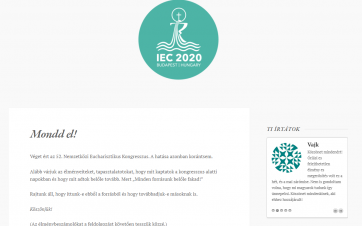
Europe is in great need of hope

- Your Eminence, you very much wanted Pope Francis to come to the Congress, even with the date having been moved from 2020 to 2021. Was there any moment when the thought of giving it up crossed your mind?
- Giving up what? The International Eucharistic Congress is the Congress of the entire Church. It was the Holy Father himself who decided to hold the IEC (International Eucharistic Congress) next in line in Budapest, and it was announced by Him personally in a video message at the previous Congress in Cebu, Philippines. It was a decision that we were all delighted to hear, and not only we Hungarians, but everyone who happened to be present.
The Pontiff’s personal attendance could be a great sign of hope after almost two years of confinement, fear, and isolation due to the pandemic. Over the years of the Congress preparatory works we were praying and are still going on with these prayers at the end of the Sunday Holy Masses so that this great meeting would bring a spiritual renewal. We are well aware of depending on the Divine Providence, thus the IEC Secretariat has developed various scenarios for the possible different situations.
Horizons
- What do you expect from the International Eucharistic Congress for Hungary and for Europe?
- The meeting with Jesus! The grace of reconciliation for our society and for Europe, which is in a great need of hope. Needless to say we are not talking about a triumphalist event, but rather about an open-heart invitation for everyone.
We have got great experiences in the field of dialogues with the needy through various organizations of the Caritas, as well as with the world of science and culture already during the preparatory stage. We organized a conference on topics of faith, science and society, with the participation of numerous theological professors of different denominations and other religious communities, not to mention the various sectors of the “lay” scientific life. Last year, on account of the pandemic, the conference participants were unable to gather in person, yet their lectures were published in Hungarian and English, even partly in Italian. We therefore also expect from the Congress the intensification of the dialogue throughout the entire society.
- What kind of memory has been kept from the previous, the 1938 Congress? Is there any difference from that of the present one?
- The 1938 Budapest International Eucharistic Congress, with the Papal Legate, Cardinal Eugenio Pacelli’s personal attendance was held in an atmosphere full of fear and tension. The wind of the war was already in the air. No one could come from Germany, neither the faithful, nor even the delegates. The Anthem of the Congress was a beautiful song, a prayer for peace and the unity of peoples and nations. This song has become so popular in the Church that the whole participating crowd sang it during Pope Francis’ Mass in Csíksomlyó, Romania in 2019. Even if today our fears are a little bit different, it still remains relevant that all nations, even the entire humanity have got God’s invitation to unite in brotherly love. Jesus Christ, who is present amongst us, and in us in the Holy Eucharist, is the light of the nations. The Church has been given the mission to continue his work throughout history.
Crossings
- How can you involve into the Congress those Hungarians who have been living for decades in the neighbouring countries, like Romania?
- During the preparatory years the symbol of the Congress, the Mission Cross was taken around Hungary and the neighbouring countries. We paid visits with it to dioceses and parishes at archbishops’ and vicars’ invitation. The symbol itself is a three and a half metres high cross with the relics of Hungarian Saints embedded in.
While we were working on to form this Cross, which was blessed by Pope Francis in Rome it became clear that the Christian Saints’ testimonies were common testimonies. They lived here on our lands giving their lives for the gospel: Italians, Germans, Hungarians, Slovaks, Poles, Romanians, Croats and others, especially the numerous martyrs of the twentieth century! It is their blood that unites peoples, while helping the reconciliation also between believers and non-believers in our societies. Therefore, we do hope that our memory is going to be cleared in the light of mercy. Hungarian-speaking believers and priests, and even many others around the surrounding countries are enthusiastically looking forward to the Eucharistic meeting, and pray for this grandiose event. Over the years of preparation we have organized international adorations for certain dates via the internet. The next worldwide adoration will take place on June 5, 2021.
- What opportunities will be there for the minorities, such as those of the Roma minority?
- As for the Roma minority, the Hungarian Bishops’ Conference accepted the translation of the liturgy into Lovari language. Roma musicians, some of them are professors at the Academy of Music, composed a beautiful Mass. For one of the afternoons we are planning a program to present their rich and popular folk culture. Furthermore, other minorities will also have the chance to give contribution to the liturgical and cultural programs.
- How is the Congress considered by other Christian denominations?
- In preparation for the Congress several conferences were held over the recent years, whereby valuable lectures were given by rabbis, Protestant bishops, specialists from various Orthodox Churches (the Ecumenical Patriarchate, the Russian, the Romanian and the Serbian Orthodox Church). I would say, the open and friendly atmosphere was clearly felt all along the preparatory period. Moreover, a scientific conference with “ecumenical” speakers is scheduled for the days preceding the Congress opening.
Several denominations have also participated in the ecclesiastical art exhibitions organized on Eucharistic themes. “Ecumenical” guests have also been cordially invited for the programs of the Eucharistic Congress. I’m convinced that both the other Christians denominations and the Jewish community –one the most significant one in Europe- are enthusiastically looking forward to the meeting with the Holy Father.
- What is your relationship with the state administration and how do you assess the harsh criticism of populism against the current government?
- There has been one International Eucharistic Congress in Hungary so far, namely in 1938. That time our country received a particularly high recognition from both the Vatican and the Catholic world for the way the event had been organised and handled. Currently we are preparing something similar. In the then tense situation the organisers paid special attention to avoid all kinds of political issues around the Congress, and this aim had been perfectly fulfilled.
Our relationship with the government and the leadership of the capital, then and now, is considered essential for the best realization of the world event. As in 1938, also in 2021, the Congress is not a political, but definitely a religious event. The Hungarian Catholic Church asked for the Holy See’s approval to host and organise this event. Shortly after the Holy Father’s announcement on appointing Hungary to be the host of the Congress, we contacted the government, since there were a number of steps in materializing such a grandiose event – such as security issues, venues, provision of financial resources- for the coordination of which the joint work was inevitable.
In September we are preparing ourselves for confessing our faith. Obviously, all along the Congress programs we do our best to present our culture, spiritual heritage, our amazing country and capital city, without forgetting that the focus of the week is on the Eucharist, on the living Christ.
Photo/Source: SettimanaNews










